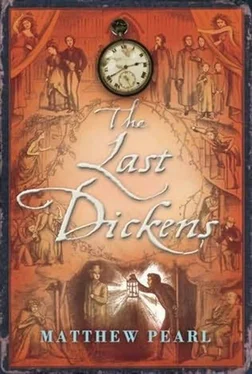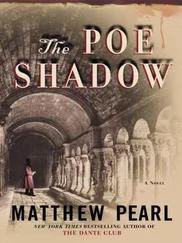Osgood nodded away the last aside. “Your idea is simply not in our authors’ interests, Major. We shall always see our books as wiser and better than objects, and I think I speak for Mr. Fields in saying we would rather continue in that light even if it means we do not last. I'm afraid you cannot ever de-Bostonize this house.”
Osgood decided to swiftly end the meeting using one of Fields's techniques. He passed his foot down on a pedal hidden under the desk and Daniel Sand came to alert Osgood of an “emergency” that would forestall any further conversation. But Harper stood and signed his understanding.
“You needn't bother with the performance,” Harper called out before the clerk had the chance to speak.
Daniel, acting out his urgent entrance, looked to Osgood with sad eyes. Osgood nodded permission to go.
Harper continued, a dark cloud passing over his face. “I know every trick, every plan, every purpose in this trade, Mr. Osgood, and I know it ten times better than my dear brother the mayor did, God bless the proud man. Come! The old methods will not save you from the truth I have delivered to you today.”
They eyed each other, taking stock.
Harper suddenly laughed, but a laugh that said the joke was his and his alone. “Well, it is true what they say, I suppose. Courtesy is courtesy but business is business.”
“Who says that, Major?”
“Me. And you shouldn't believe Mr. Fields and yourself are so different from us, Mr. Osgood, shielded from the world by sunshiny talk and your high ambitions. We've watched you. Remember, the angel may write, but “tis the devil that must print. You should have gone into the ministry if you wanted to remain a believer.”
“Major, I wish you good afternoon.” Osgood waited silently until Harper had no choice but to gather his belongings.
“Oh! By the by, the new mystery that Dickens is writing, I hear, shall be enthralling,” Harper said offhandedly to Osgood as he brushed the rainwater from his hat. “Chapman in London, they say, is paying a fortune to publish it. The Murder of Edward Drory?” “The Mystery of Edwin Drood , I believe he has decided to call it.” “Yes, yes, that is it! I am on the very tiptoe of expectation to see where Dickens, the Great Enchanter, will take us this time.”
DICKENS!-THAT STRANGE WORD, that name of names, the man-meant the world to the firm of Fields, Osgood & Co. The Major knew it, which is why his mention of the new novel was also a threat.
Fields had a few years earlier made two big propositions to the world's most popular novelist, Charles Dickens: first, that Dickens come to America on a grand reading tour, and second, that their firm be the author's exclusive publisher in America. From his estate in the English countryside, Dickens agreed to both terms, which prompted the loud grousing of all the other American publishers-especially the Harper brothers.
There was no international copyright agreement between the United States and England. This meant that any American publisher could publish any British book without permission of the author. There did exist what was known as trade courtesy, however: when an American publisher made an agreement to be the publisher of a foreign book, other American publishers would respect it. The Harper brothers were notorious, though, for printing cheap, unauthorized editions (making their own changes to the text, sometimes carelessly and sometimes to suit an English topic better to an American audience). They'd leave the Harper torch off the title page and sell the spurious edition in railway cars or on the street or by subscription.
Thus, Major Harper's alluding to The Mystery of Edwin Drood was a reminder that Harper could undermine the enormous investment by Fields, Osgood & Co. in Drood by flooding their own cheap editions into the marketplace. The demand would be high for Dickens's new book, and what would the typical hardworking American reader choose? Spend two dollars for the book from Fields, Osgood & Co.- or seventy-five cents from one of Harper's hawkers or peddlers?
The Boston publisher would be powerless to stop it.
Charles Dickens's five-month-long reading tour of the United States arranged by Fields and Osgood in the winter of 1867-68 had proven an enormous success. It felt historic even as it was happening. Thousands heard him perform. Osgood worked industriously during the tour, charged with the duties of a treasurer and with meeting Dickens's sometimes fickle demands, in addition to smoothing over conflicts and troubles. At the end of the tour, there were a hundred thousand dollars in profits in the pockets of the “Chief”-as he was called by Dickens's manager, Dolby.
Fields, Osgood & Co. made money on the readings-5 percent of gross receipts-but their real reward for the faith they had shown in Charles Dickens was yet to come. That would come with the publication of The Mystery of Edwin Drood.
The whole world awaited it, as had been true of each Dickens novel since The Pickwick Papers and Oliver Twist placed the former court reporter's name before the public thirty-five years before. Dickens alone, among all the writers of popular fiction of the day, could employ wit and discernment, excitement and sympathy, in equal parts in each one of his books. The characters were no mere paper dolls, nor were they thinly veiled extensions of Charles Dickens's own persona. No, the characters were utterly themselves. In a Dickens story, readers were not asked to aspire to a higher class or to hate other classes than their own but to find the humanity and the humane in all. That is what had made him the world's most famous author.
This time the wait for a new book had been nearly five years, longer than any other interval between books in the past. “The public is ripe for it!” Fields had said. Drood would tell the story of a young gentleman-Edwin Drood-an honest though ambling character who vanishes after provoking the jealousy of a devious uncle named John Jasper, a respectable citizen with a double life as a drug fiend. Dickens promised in his letters to Fields that the book would be “very curious and new” for his readers.
Ralph Waldo Emerson had been sitting in Fields's office when Fields and Osgood had read Dickens's letter about the novel.
“I am afraid Dickens has too much talent for his genius,” Emerson announced in his way of an old oracle bored by his own pronouncements.
“How do you mean, my dear Waldo?” asked Fields. A publisher in the trade as long as Fields would never be roused by one writer kicking another.
“His face daunts me!” Emerson exclaimed at the Dickens photograph on the wall showing a strong but weather-beaten profile, the far-off look in the strict military eye. “You and Mr. Osgood would persuade me that he is a genial creature. You would persuade me that he is a sympathetic man superior to his talents, but I believe he is harnessed to them. He is too consummate an artist to have a thread of nature left.”
Emerson did not realize how much his publishers needed Dickens and could no longer depend only on the likes of Longfellow, Lowell, Holmes-nor even their Concord Sage, Mr. Emerson-to keep them afloat. Years earlier, the mutual admiration society of Boston brought floods of readers to the publishing house for their novels and poems. Effortlessly, Longfellow's sensation, The Song of Hiawatha , had flowed from the presses and out the doors of bookshops in Os-good's first months of working at the firm! Now the best Osgood seemed able to do was to persuade Dr. Holmes to write a pale sequel of The Autocrat of the Breakfast Table; smile at Mrs. Stowe over a well-intended morality novel half as courageous as Uncle Tom; or encourage Longfellow's slow labor on his long, somber poem about Jesus Christ, The Divine Tragedy , though republishing Longfellow's controversial Divine Comedy translation, yet again, would be more lucrative.
Читать дальше












